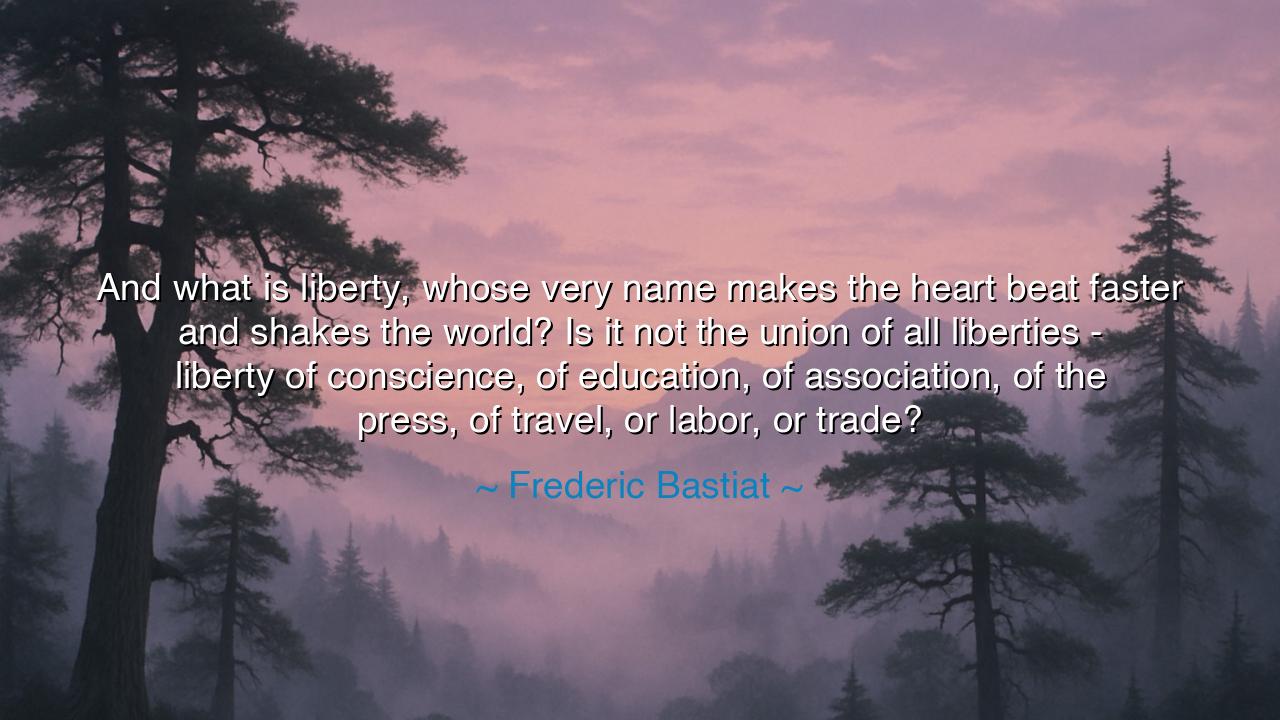
And what is liberty, whose very name makes the heart beat faster
And what is liberty, whose very name makes the heart beat faster and shakes the world? Is it not the union of all liberties - liberty of conscience, of education, of association, of the press, of travel, or labor, or trade?






Hear the thunderous cry of Frédéric Bastiat, who asked: “And what is liberty, whose very name makes the heart beat faster and shakes the world? Is it not the union of all liberties—liberty of conscience, of education, of association, of the press, of travel, of labor, of trade?” These words, born in the fires of the 19th century, echo through the ages as a hymn to freedom. They remind us that liberty is not a fragment, not a single gift bestowed by rulers, but the totality of freedoms woven together. To break even one strand is to weaken the whole.
Mark this truth, O seeker: many believe liberty is only the absence of chains, the freedom to walk where one wills. But Bastiat knew that freedom is deeper, more encompassing. Liberty of conscience—to think, to believe, to worship without fear. Liberty of education—to learn truth and not be chained in ignorance. Liberty of association—to gather with others in common cause. Liberty of the press—to speak boldly, to challenge power. Liberty of travel—to move across the earth as one chooses. Liberty of labor and trade—to work, to create, to exchange without coercion. Each is vital, but together they form the union of liberties, and without this union, the spirit of mankind withers.
Consider the American Revolution. Its cry for liberty was not just a cry against taxation—it was a demand for a union of freedoms: to worship freely, to publish dissent, to trade without tyranny, to assemble in unity. When the Declaration of Independence proclaimed that all men are endowed with unalienable rights, it was not a single liberty they envisioned, but a tapestry of them. And it was that tapestry that gave the colonists courage to stand against an empire. Bastiat’s words echo this truth: liberty is not a single note, but a full symphony.
Or look to the struggles of Eastern Europe in the 20th century. Behind the Iron Curtain, people might still walk, but their press was silenced, their labor controlled, their associations forbidden, their consciences policed. They had some freedoms in appearance, but the union of liberties was broken, and so true liberty was absent. When the Berlin Wall fell, it was not merely concrete that crumbled, but the chains on conscience, on speech, on trade, on education. The rejoicing of the people was not for a partial gift, but for the restoration of wholeness.
And do not forget the courage of those who fought for civil rights in America. They marched not only for the liberty to vote, but for the liberty to learn in schools without segregation, to associate without fear, to labor with dignity, to travel without restriction. Their struggle reminds us that liberty cannot be selective. If one group is denied the fullness of freedoms, then liberty itself is wounded. Bastiat’s teaching lives here: liberty is indivisible. To harm one part is to harm all.
But O listeners, let us not think these struggles belong only to the past. Even now, powers rise that would fragment liberty, offering one freedom while stealing another. A people may be told, “You are free to trade,” but forbidden to speak. Or told, “You are free to speak,” but denied the right to work or move. Bastiat warns us against this illusion. True liberty cannot be divided; it must be whole, or it is but a shadow.
The lesson for us is this: guard not only your own freedom, but the full union of liberties for all. Do not be satisfied when one liberty is granted if others are denied. Demand conscience, education, association, press, travel, labor, and trade—all together, all for all. For as Bastiat declared, it is this union that makes the heart beat faster and shakes the world. Without it, humanity remains in chains; with it, humanity rises into its dignity.
Therefore, O children of freedom, let this be your charge: cherish every liberty, fight for the ones that are lost, and protect the ones you hold. For liberty is not the privilege of the few, nor the fragment of the whole—it is the complete inheritance of all mankind. And when you defend the union of liberties, you do not only guard your own life—you guard the soul of the world.






AAdministratorAdministrator
Welcome, honored guests. Please leave a comment, we will respond soon